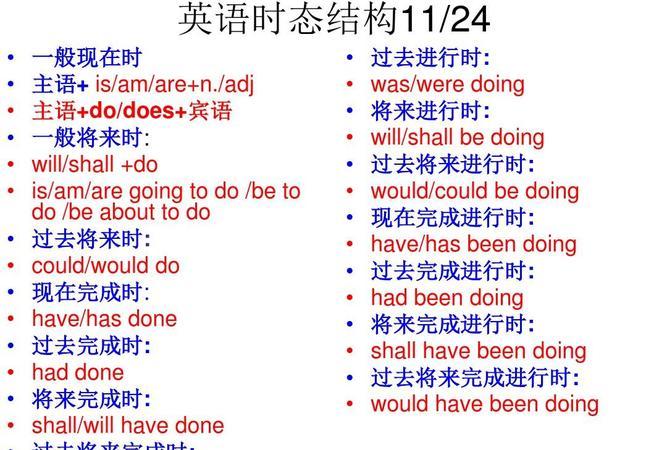英语中的六种基本时态包括现在时态、过去时态、将来时态、现在完成时态、过去完成时态和将来完成时态。每种时态都有其特定的陈述句、否定句和疑问句的句型结构。例如,现在时态的陈述句结构为:主语 + 现在时态动词 + 其他成分;否定句的结构为:主语 + do/does not + 动词原形 + 其他成分;疑问句的结构为:do/does + 主语 + 动词原形 + 其他成分 + ?。

现在时态
现在时态表示现在正在发生的动作或状态。
陈述句
陈述句的结构为:主语 + 现在时态动词 + 其他成分。
例如:
- 我喜欢吃冰淇淋。(I like eating ice cream.)
- 他经常看电影。(He often watches movies.)
否定句
否定句的结构为:主语 + do/does not + 动词原形 + 其他成分。
例如:
- 我不喜欢吃辣的食物。(I do not like spicy food.)
- 他不常去健身房。(He does not often go to the gym.)
疑问句
疑问句的结构为:do/does + 主语 + 动词原形 + 其他成分 + ?。
例如:
- 你喜欢喝咖啡吗?(Do you like drinking coffee?)
- 他每天晚上玩游戏吗?(Does he play games every night?)
过去时态
过去时态表示过去发生的动作或状态。
陈述句
陈述句的结构为:主语 + 过去式动词 + 其他成分。
例如:
- 我昨天去了学校。(I went to school yesterday.)
- 他小时候喜欢钓鱼。(He liked fishing when he was a child.)
否定句
否定句的结构为:主语 + did not + 动词原形 + 其他成分。
例如:
- 我昨天没有看电影。(I did not watch a movie yesterday.)
- 他从来没有去过欧洲。(He has never been to Europe.)
疑问句
疑问句的结构为:did + 主语 + 动词原形 + 其他成分 + ?。
例如:
- 你昨天晚上去了哪里?(Where did you go last night?)
- 他小时候喜欢玩什么游戏?(What games did he like playing when he was a child?)
将来时态
将来时态表示将来要发生的动作或状态。
陈述句
陈述句的结构为:主语 + will + 动词原形 + 其他成分。
例如:
- 我明天会去看电影。(I will watch a movie tomorrow.)
- 他明年要去巴黎旅游。(He will travel to Paris next year.)
否定句
否定句的结构为:主语 + will not + 动词原形 + 其他成分。
例如:
- 我明天不会去上班。(I will not go to work tomorrow.)
- 他这个周末不会去旅游。(He will not travel this weekend.)
疑问句
疑问句的结构为:will + 主语 + 动词原形 + 其他成分 + ?。
例如:
- 你明天会去上课吗?(Will you go to class tomorrow?)
- 他明年会在哪里过生日?(Where will he celebrate his birthday next year?)
现在完成时态
现在完成时态表示过去某个时间点开始,一直持续到现在的动作或状态。
陈述句
陈述句的结构为:主语 + have/has + 过去分词 + 其他成分。
例如:
- 我已经吃完早餐了。(I have eaten breakfast already.)
- 他看过这部电影。(He has watched this movie.)
否定句
否定句的结构为:主语 + have/has not + 过去分词 + 其他成分。
例如:
- 我还没有写完这篇论文。(I have not finished writing this paper.)
- 他没有去过日本。(He has not been to Japan.)
疑问句
疑问句的结构为:have/has + 主语 + 过去分词 + 其他成分 + ?。
例如:
- 你见过这个人吗?(Have you met this person?)
- 他已经去过欧洲了吗?(Has he been to Europe yet?)
过去完成时态
过去完成时态表示过去某个时间点之前已经完成的动作或状态。
陈述句
陈述句的结构为:主语 + had + 过去分词 + 其他成分。
例如:
- 我已经吃过晚饭了,然后去了电影院。(I had dinner and then went to the cinema.)
- 他回家后已经睡觉了。(He had slept after he got home.)
否定句
否定句的结构为:主语 + had not + 过去分词 + 其他成分。
例如:
- 我还没有见过他之前就离开了。(I had not left before I saw him.)
- 他还没有完成任务就回家了。(He had not finished the task before he went home.)
疑问句
疑问句的结构为:had + 主语 + 过去分词 + 其他成分 + ?。
例如:
- 你之前已经去过这个地方了吗?(Had you been to this place before?)
- 他到达之前已经打电话通知你了吗?(Had he called you before he arrived?)
将来完成时态
将来完成时态表示将来某个时间点之前已经完成的动作或状态。
陈述句
陈述句的结构为:主语 + will have + 过去分词 + 其他成分。
例如:
- 我明年这个时候已经完成了学业。(I will have finished my studies by this time next year.)
- 他在你到达之前已经完成了工作。(He will have finished his work before you arrive.)
否定句
否定句的结构为:主语 + will not have + 过去分词 + 其他成分。
例如:
- 我下个月之前还没有完成这个项目。(I will not have finished this project before next month.)
- 他到达之前没有完成任务。(He will not have finished the task before he arrives.)
疑问句
疑问句的结构为:will + 主语 + have + 过去分词 + 其他成分 + ?。
例如:
- 你明年这个时候会完成学业吗?(Will you have finished your studies by this time next year?)
- 他到达之前会完成任务吗?(Will he have finished the task before he arrives?)
